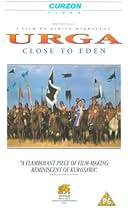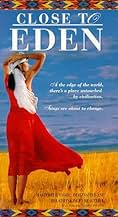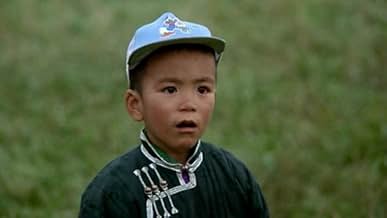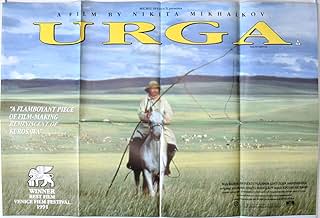AVALIAÇÃO DA IMDb
7,5/10
4 mil
SUA AVALIAÇÃO
O fazendeiro Gombo (Bayaertu) mora com sua mulher, filhos e avó em uma humilde tenda, na Mongólia. Eles têm suas vidas mudadas quando Serguei (Vladimir Gostyukhin), um motorista de caminhão ... Ler tudoO fazendeiro Gombo (Bayaertu) mora com sua mulher, filhos e avó em uma humilde tenda, na Mongólia. Eles têm suas vidas mudadas quando Serguei (Vladimir Gostyukhin), um motorista de caminhão russo, fica preso com seu veículo nas redondezas.O fazendeiro Gombo (Bayaertu) mora com sua mulher, filhos e avó em uma humilde tenda, na Mongólia. Eles têm suas vidas mudadas quando Serguei (Vladimir Gostyukhin), um motorista de caminhão russo, fica preso com seu veículo nas redondezas.
- Direção
- Roteiristas
- Artistas
- Indicado a 1 Oscar
- 5 vitórias e 12 indicações no total
Nikolay Vashchilin
- Nikolai
- (as Nikolai Vachtchiline)
Larisa Kuznetsova
- Marina
- (as Larisa Kuwnetsova)
Nikita Mikhalkov
- Bicycle rider
- (não creditado)
Avaliações em destaque
The best definition I can give to movies I greatly admire is that they take me someplace I don't expect to go.
It can be a special location. It can be a special moment. It can be a special revelation.
Close to Eden, as this movie has been titled in the United States, offers the entire combination. A 1992 Russian nominee for the Oscar for Best Foreign Language Film, the movie opens on the vast grassy expanses of the steppes of Mongolia, where the setting initially is evocative of a certain timelessness. The historical instant cannot be ascertained confidently, even within an error margin of a few centuries. Nor do we know what the movie designs ultimately to tell us.
Such uncertainty begins to give way as a vehicle and visitor enter the scene and are involved in a mishap that results from first sleepiness and then fright. The nature of the vehicle and visitor narrow the reference era to an accuracy level of mere decades. From there, the plot leads to a likable nuclear family of herders, to which a grandmother is attached. We follow their story and soon learn when, among the vast expanses of time, it occurs.
The theme here is subtly...ecological...in three parts. The first part concerns the lifestyle of the family, and its self-sufficiency. The second part concerns the travel the father undertakes, and the reason for the travel, an assigned errand he seeks to accomplish in the course of that journey. The third part concerns the conclusion, where the issue of time again intervenes. There is in fact no timelessness, but rather its passage. The narrator in A River Runs Through It is "haunted by waters." Similarly, the ending of Close to Eden is haunted by grasses. Its status as one of the great foreign films arrives in the last few knockout minutes.
It can be a special location. It can be a special moment. It can be a special revelation.
Close to Eden, as this movie has been titled in the United States, offers the entire combination. A 1992 Russian nominee for the Oscar for Best Foreign Language Film, the movie opens on the vast grassy expanses of the steppes of Mongolia, where the setting initially is evocative of a certain timelessness. The historical instant cannot be ascertained confidently, even within an error margin of a few centuries. Nor do we know what the movie designs ultimately to tell us.
Such uncertainty begins to give way as a vehicle and visitor enter the scene and are involved in a mishap that results from first sleepiness and then fright. The nature of the vehicle and visitor narrow the reference era to an accuracy level of mere decades. From there, the plot leads to a likable nuclear family of herders, to which a grandmother is attached. We follow their story and soon learn when, among the vast expanses of time, it occurs.
The theme here is subtly...ecological...in three parts. The first part concerns the lifestyle of the family, and its self-sufficiency. The second part concerns the travel the father undertakes, and the reason for the travel, an assigned errand he seeks to accomplish in the course of that journey. The third part concerns the conclusion, where the issue of time again intervenes. There is in fact no timelessness, but rather its passage. The narrator in A River Runs Through It is "haunted by waters." Similarly, the ending of Close to Eden is haunted by grasses. Its status as one of the great foreign films arrives in the last few knockout minutes.
"Close to Eden" (Russian, 1992): Living on the simple, harsh, flowing Steppes of China/Mongolia, we meet a traditional family. By the photography and music, it's clear from the start that we should to accept, if not admire, their difficult but very satisfying life. Yes, there are signs of contemporary urban society the young son wears a baseball cap, the daughter plays the accordion, and the wife wants her husband to travel to the nearest city for condoms (they are already over the legal limit of children), and a television. Eventually in the position of helping a stranded Russian truck driver, the husband travels with him to an urban "center" and deals with "city" life. "Close to Eden" patiently mutates from a beautifully straight forward "document", to one full of symbols - not just the threat of encroaching urban blight, but reminders of their proud racial past. Eventually narrated by the fourth son (any more than two is illegal in rural China), and named after the great Genghis Khan, he completes the story long after his grandmother, parents, and original hut are gone.
One of the most beautiful and lyrical films that I have ever seen, one of those experiences where you walk into a theatre not knowing what to expect and walk out of the theatre wanting to drag everyone you've ever known into the theatre to see it.
I can't imagine why this Oscar-nominated film is not available on DVD but it's well worth your annual haul-out-the-VHS-player-one-more-time weekend look. At first you'll feel like you're eavesdropping on something very private, but by the end of the film you may wish that you were one of the family.
I don't' like to give away plot points when commenting on a movie, in fact I don't even like to watch previews-of-coming-attractions because they give away too much of the story. I like to walk into a movie blind, and trust me on this one, you'll be glad you made the journey.
I can't imagine why this Oscar-nominated film is not available on DVD but it's well worth your annual haul-out-the-VHS-player-one-more-time weekend look. At first you'll feel like you're eavesdropping on something very private, but by the end of the film you may wish that you were one of the family.
I don't' like to give away plot points when commenting on a movie, in fact I don't even like to watch previews-of-coming-attractions because they give away too much of the story. I like to walk into a movie blind, and trust me on this one, you'll be glad you made the journey.
Nikita Mihalkov is a god when it comes to film. The guy below me is probably a not very smart, Hollywood films are 20% good and the rest is garbage just like your comment. I have seen but a few good American films the rest is the same old crap. I would like to say that American films have no life its always the same. This film has an amazing plot with its twist and turns make it a master piece. I am just trying to get my point across but the policy won't let me have anything smalled than 10 lines. I would love to me Nikita Mihalkov and just let him know that he is such a great director. So please when you see this really try to learn to speak and understand the Russian language so you can actually grasp what the movies is all about and really suck in the meaning of it.
10johan-16
This movie shows us a world without any borders, laws. Just a bunch of people who live in a superb nature, which fills the wide moviescreen in its endless beauty. It reminds us, how far we are away from nature, from our roots of our ancesters. That's why I think this movie appeals the people from all over the world. And especially those who like the widescreen movies from John Huston to Visconti. Only for the superb shots you can see it over and over again. It's, without any doubt a timeless beaty
Você sabia?
- CuriosidadesThis was the first film nominated for an Academy Award for Best Foreign Language Film from Russia. Previous nominees from that country had been submitted from The Soviet Union. It lost to France's Indochina (1992).
Principais escolhas
Faça login para avaliar e ver a lista de recomendações personalizadas
- How long is Close to Eden?Fornecido pela Alexa
Detalhes
- Data de lançamento
- Países de origem
- Idiomas
- Também conhecido como
- Close to Eden
- Locações de filme
- Empresas de produção
- Consulte mais créditos da empresa na IMDbPro
Bilheteria
- Faturamento bruto nos EUA e Canadá
- US$ 377.832
- Faturamento bruto mundial
- US$ 377.832
- Tempo de duração1 hora 59 minutos
- Cor
- Proporção
- 1.85 : 1
Contribua para esta página
Sugerir uma alteração ou adicionar conteúdo ausente

Principal brecha
By what name was Urga - Uma Paixão no Fim do Mundo (1991) officially released in India in English?
Responda























